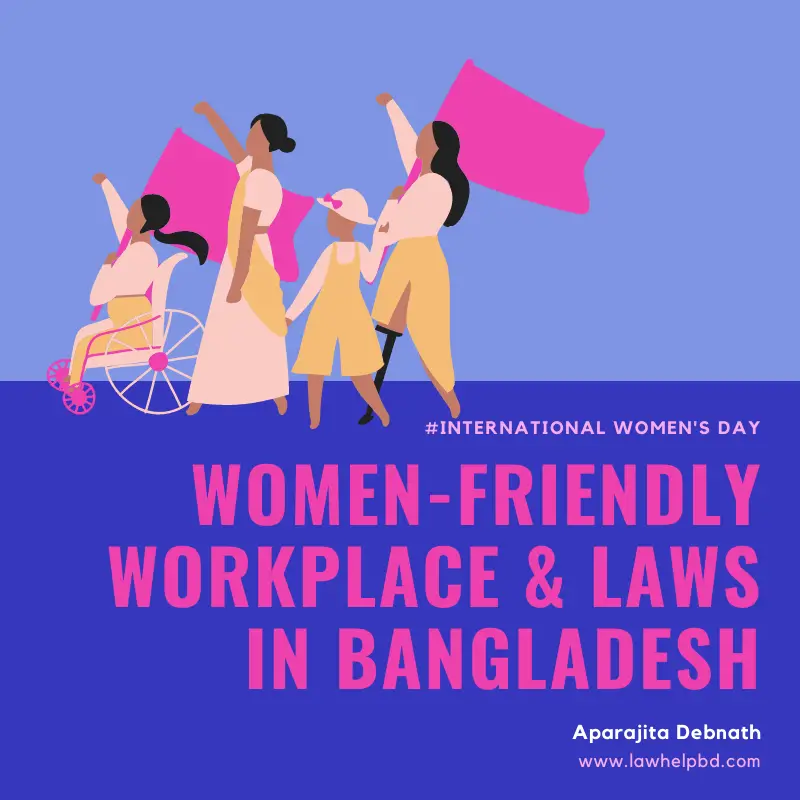Legal obligation to create a more women-friendly workplace
Women constitute half of the world’s population. According to the World Bank collection of development indicators, female population for Bangladesh till 2021 was 82.3 million which is 49.44% of the total population and the ratio is growing at an average annual rate of 1.93%. No sustainable development is possible by keeping such a huge population unemployed. Though women are taking active participation in public & private sectors lately; still the ratio in comparison with male is 11.5%. The remaining 89.5% of women are not directly involved in any economic or financial work. Although the Constitution of Bangladesh emphasizes on equal participation of women in all spheres of public life and considers work as a right and duty, still the number of women working in urban Bangladesh has been declining since 2010.

Legal obligation to create a more women-friendly workplace
The Centre for Development and Employment Research (CDER) and the FES (Friedrich-Ebert-Stiftung), Bangladesh has published this report last year. There are many reasons which contribute to the non-participation of women in the job market, such as social stigma, lack of security, inadequate salary range compared to men, gender-based discrimination, sexual harassment in workplace etc. Even if some women start working at an early age, they cannot continue their career after marriage because of being restricted by in-laws. Situation worsens when they become a mother. Working women already have to face many difficulties, but the difficulties of working mother are on another level!
Considering all these facts which lag behind female workforce, some notable steps have been taken by the government towards creating a more women-friendly workplace. Very recently on 09 January 2022, the High Court issued a rule upon a writ petition filed by Ain O Salish Kendra (ASK) to form a committee to prevent sexual exploitation of women in every govt and non-govt institutions including educational institutions. Earlier in 2009, the HC issued another rule in response to a petition filed by the Bangladesh National Women Lawyers’ Association (BNWLA), to set out guidelines for protection against sexual harassment at workplaces and other institutions. But the directives are not implemented even after a decade. However, in 2019 the government launched the National Action Plan (NAP) on Women, Peace and Security (WPS) 2019-2022, where the government has plans to increase the involvement of women and their benefit, such as developing gender-sensitive laws and policies to promote women’s participation. In the same year, the HC issued a rule followed by a writ petition filed by Advocate Ishrat Hasan to set up breastfeeding corners and baby care corners at all public places including workplaces across the country. This will allow the mothers to feed their children in any place without any hesitation.
Another recent appreciable step is to enact the ‘Child Day Care Center Act, 2021’. This is a very well-timed law as for working mother question arises- If both the parents leave for work, who is to take care of the baby? Depending on house-helps seems risky to many parents which results in putting much pressure on the mother. Eventually, the mother has to sacrifice her career for the child. Although according to International Labor Organization, employers have a legal responsibility towards the female worker’s family as well. Thus every office must have childcare facility on their premises. This will keep working mothers tension-free and will result in their best productivity of them.
The Act aims at ensuring the safety of the child and care in a suitable environment with provisions of punishment in case of default. According to sections 4-6 of the Act, every government, semi-government, autonomous and non-government organizations may, under their own management, establish and operate daycare centers, but registration is compulsory only for individuals or non-government organizations. The Act ensures all the services for the child including health care, safety, medical, recreation, education, suitable environment and other necessary facilities in the child day-care center, and the licensing authority can impose a fine up to 50 thousand takas if any rule is violated. Sections 23-24 provides if the safety or health of the child is endangered at the center due to negligence, they shall be liable to imprisonment for a term not exceeding two years or to a fine not exceeding two lakh taka or both. In addition, cruel treatment to a child is punishable by imprisonment for a term not less than two months or a fine of fifty thousand takas or both. Finally, missing a child from a child daycare center would be considered as a serious offense. For this, the responsible person will be punished with imprisonment of up to ten years and fine of five lakh taka. The Act also considers any digital evidence as admissible in court during the trial.
These above-mentioned steps will undoubtedly lead to the creation of more women-friendly workplace, but the root progress should be made within the mindset of the society. The family of female employees should support them at best. The participation of women in work is beneficial not only for the economic growth of the country but also for the family in hard times.
The writer is an apprentice lawyer of Dhaka Judge Court.



